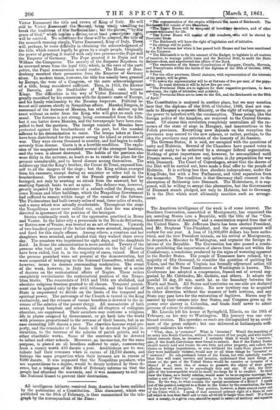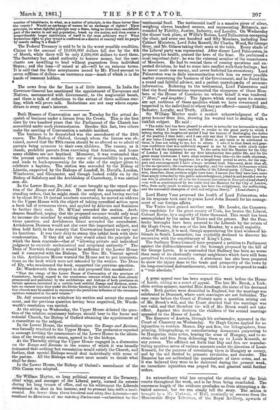The American intelligence of the week is of sonic interest.
The Southern Convention, assembled at Montgomery, has organized the six seceding States into a Republic, with the title of the "Con- federated States of America," and -a constitution copied from that of the United Slates. Mr. Jefferson Davis has been elected President, and Mr. Stephens Vice-President, and the new arrangement will endure for one year. A loan of 14,000,000 dollars raisiteeen autho- rized, and the new President intends, on his arrival at Montgomery, to despatch a Minister to Washington, -and organize the foreign re- lations of the Republic. The Convention has also passed a resolu- tion prohibiting the importation of slaves from States not within the Confederacy, a resolution produced by the signs of wavering apparent in the Border States. The people of Tennessee have refused, by a majority of fifty thousand, to consider the .question of quitting the Union, and the State of Virsi„ nia has formally adjourned, action till the result of the Peace Conference at Washington is known. This Conference has adopted a -compromise, framed out of several sug- gested by Mr. Crittenden, Mr. Guthrie, and others. It adopts the parallel 36 deg..30 min. north lat. as the boundary between the North and South. All States and territories on one side are declared -free, and all on-the other slave. No new territory can be acquired in either direction without the -consent of both sections, and any State may pass laws for the restoration of fugitives. Slaves may be carried by their owners into free States, and Congress gives up its power over slavery in Columbia, and binds itself never to admit persons of colour to citizenship. Mr. Lincoln left his house at 'Springfield, Illinois, on the 10th of 'February, on his -way to Washington. His journey was one con- tinued ovation. His speeches en route are distingaiihed by an avoid- ance of the great cubject ; but one delivered-at Indianapolis suffi- ciently indicates his views : "What, then, is coercion?' What is invasion?' Would the marching of an army into South Carolina, without the consent of her people, and with hostile intent towards them, be invasion ? I certainly think it would be coercion,' also, if the South Carolinians were forced to submit. But if the United States should merely hold and retake its own forts and other property, and collect the duties on foreign importations, or even withhold the mails from places where they were habitually violated, would any or all these things be +-invasion' or 'coercion?' Do out-professed lovers of the Union, but who spitefully resolve that they will resist coercion and invasion, understand that such things as these on the part of the United States would be coercion or invasion of a State? If so, their idea of means to preserve the object of their great affection would seem to be exceedingly thin and airy. If sick, the little pills of the homceopathist would be much too large for it to swallow. In their WOW the Union, as a family relation,-would seem to be no regular marriage, but rather a sort of free love' arrangement, to be maintained on passional attrac- tion. By the way, in what consists the special sacredness of a State? I speak not of the position easigned to a State in the Union by the constitution, for that by the bond we all recognize. That position, however, a State cannot carry out of the Union with it. I speak of that assumedlarimary right of a State to rule all which is less than itself and to ruin all-which is larger than itself. If a State and a county, in a given case, should be equal in extent of territory and equal in -number of inhabitants, in what, as a matter of principle, is the State better than -the county? Would an exchange of names be an exchange of rights? Upon principle, on what rightful principle may a State, being no more than one-fiftieth part of the nation in soil and population, break up the nation, and then coerce a proportionably larger subdivision of itself in the most arbitrary way? What mysterious right to play tyrant is conferred on a district of country with its people by merely calling it a State?"
• The Federal Treasury is said -to be in the worst-possible condition. Claims to the amount of 10,000,000 dollars fall due by the 4th of March, while there will be only 2,500,000 dollars to meet them. 'The -Secretary has asked authority to borrow money, but the men chants are unwilling to lend without guarantees from individual States; and the loan—if raised at all—will be on ruinous terms. It is said that the false acceptances issued by Mr. Floyd amount to 'seven millions of dollars—an enormous sum—much of which is in the -hands of imiocent holders.































 Previous page
Previous page